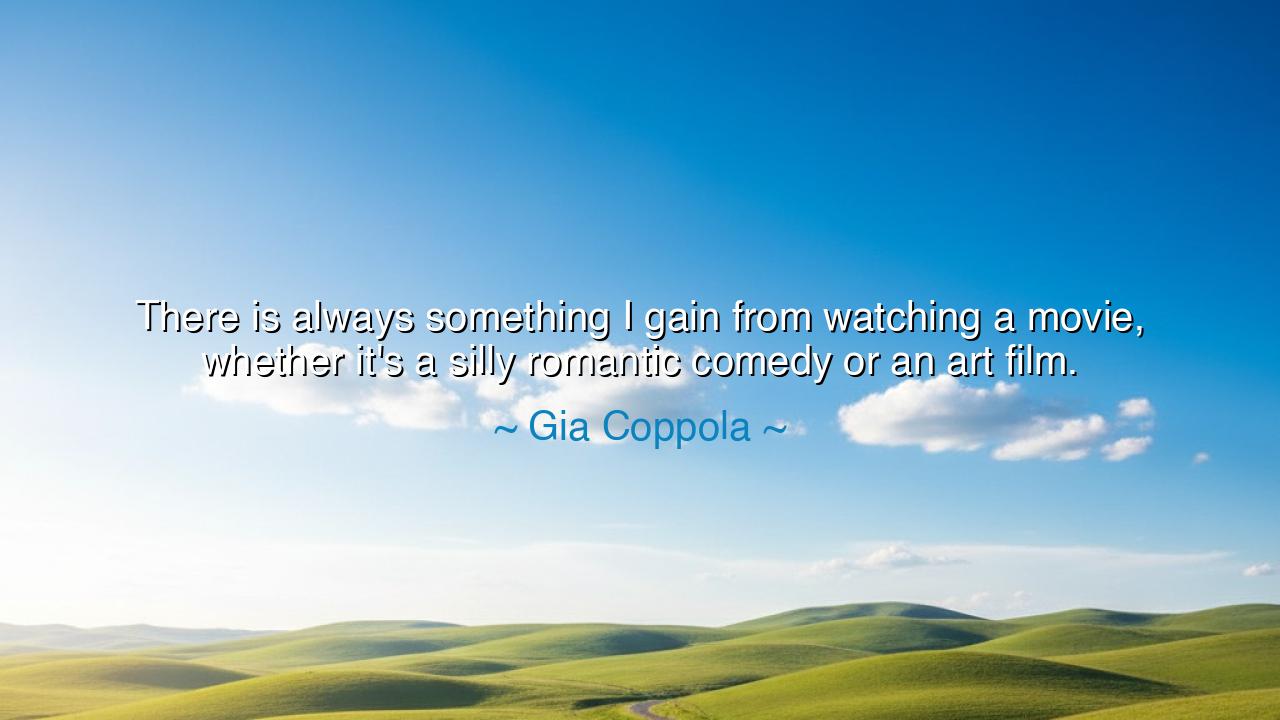
There is always something I gain from watching a movie, whether
There is always something I gain from watching a movie, whether it's a silly romantic comedy or an art film.






In the words of Gia Coppola, there shines a truth often overlooked by hurried souls: “There is always something I gain from watching a movie, whether it’s a silly romantic comedy or an art film.” At first, these words may seem modest, but within them is hidden a wisdom older than the art of cinema itself—the wisdom that every story, no matter how light or how profound, carries a spark of revelation for the attentive heart.
The ancients told tales around the fire, carved myths upon stone, and sang epics that echoed across mountains. They knew, as Coppola reminds us, that no story is ever barren of meaning. Even the silliest comedy is a mirror, showing us the clumsy beauty of our humanity. Even the most obscure art film is a torch, illuminating corners of the soul that had long been veiled. To watch, to listen, to receive a tale is to partake in a ritual of learning, where laughter, tears, and wonder are all teachers.
Consider the story of the wandering bard in Greece, who sang not only of heroes like Achilles but also of simple farmers, mischievous lovers, and bumbling tricksters. His audience did not dismiss the lighter tales as worthless. They knew that in laughter there is humility, and in simplicity there is wisdom. So too do we, when watching a romantic comedy, find lessons in forgiveness, in patience, and in the joy of rediscovering love. We laugh, yet through laughter we are healed.
On the other hand, the art film, with its silence, its shadows, and its strange beauty, beckons us into deeper waters. It challenges the mind, unsettles the heart, and plants seeds that may bloom long after the screen has gone dark. Think of Andrei Tarkovsky, the Russian filmmaker whose works seemed to stretch beyond cinema into the realm of prayer. His films were not easy to watch, yet those who endured found themselves changed, sharpened, awakened to the poetry hidden in daily life. Here we see the truth of Coppola’s words: to enter a story is to leave with more than we had before.
History itself offers witness. When Abraham Lincoln was burdened by the weight of war, he sought refuge in the theater. Many thought it frivolous, yet he declared that such entertainments gave him relief from sorrow, strength to return to duty, and even glimpses of wisdom. If a president could draw strength from art both light and solemn, who among us can deny its power? Thus the teaching holds: never scorn a story because it seems small, nor worship one simply because it appears grand. Each carries its own flame.
The lesson is clear: approach every movie, every tale, with humility and openness. Do not ask first whether it is profound or foolish; ask instead, “What gift does this story hold for me?” The heart that listens with curiosity will always depart richer. The proud who mock the silly, or the impatient who flee from the strange, close their hands to treasures offered freely. But the wise see that every story is a teacher, every tale a vessel of truth.
Therefore, let us cultivate the discipline of gathering wisdom wherever it appears. Watch widely. Laugh deeply. Think deeply. And let each romantic comedy remind you of joy, each art film remind you of depth, each tale—whether playful or profound—remind you of the many mirrors of life. In doing so, you will never leave a story empty-handed, but always filled, always enriched, always wiser than before.
So I say to you: let no story pass you by without reverence. For the gods hide wisdom in many guises—sometimes in the hero’s solemn quest, sometimes in the clown’s foolish grin. To see it, to receive it, is to live as one who is always learning, always gaining, always awake to the song of the world.






AAdministratorAdministrator
Welcome, honored guests. Please leave a comment, we will respond soon